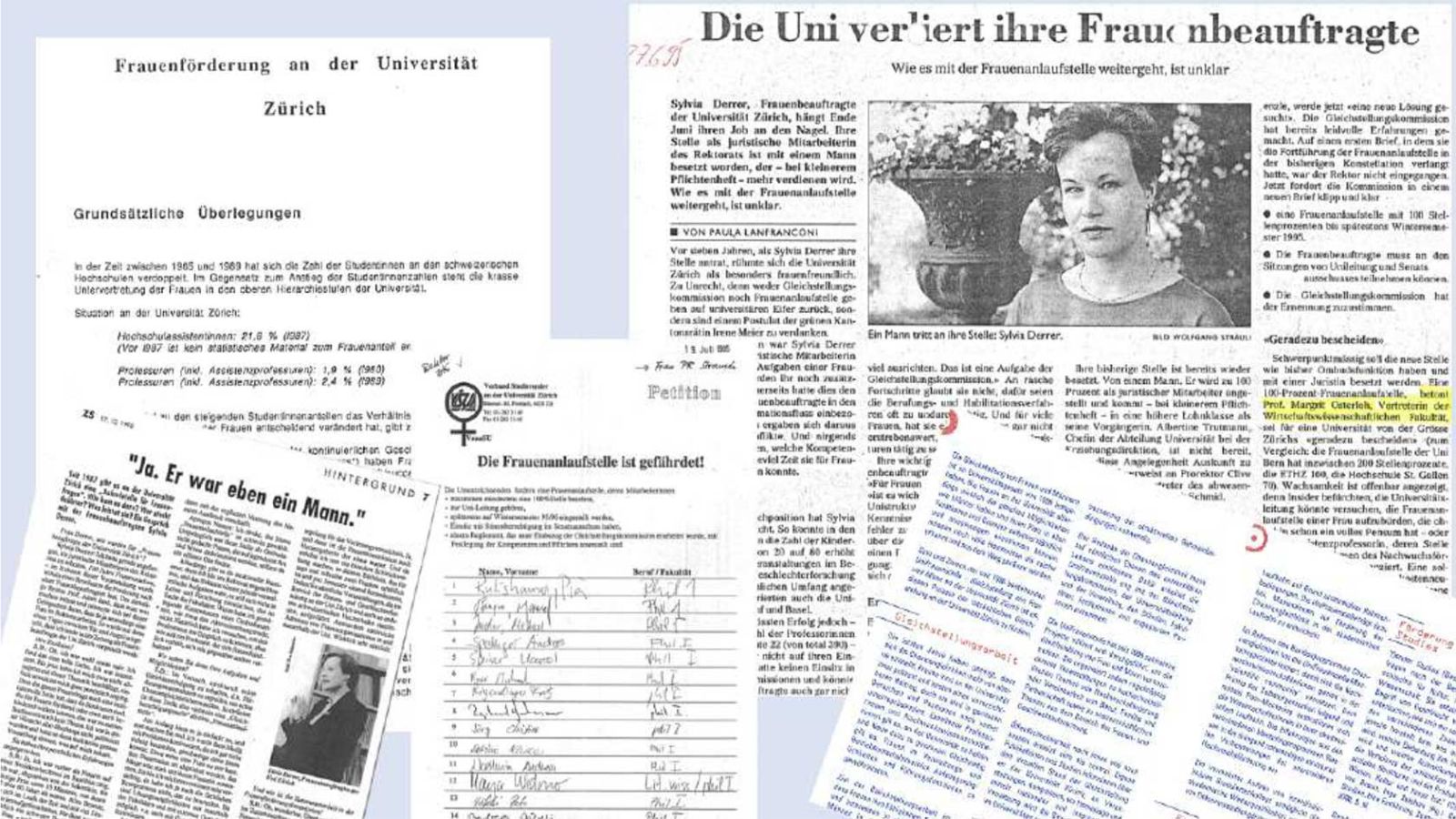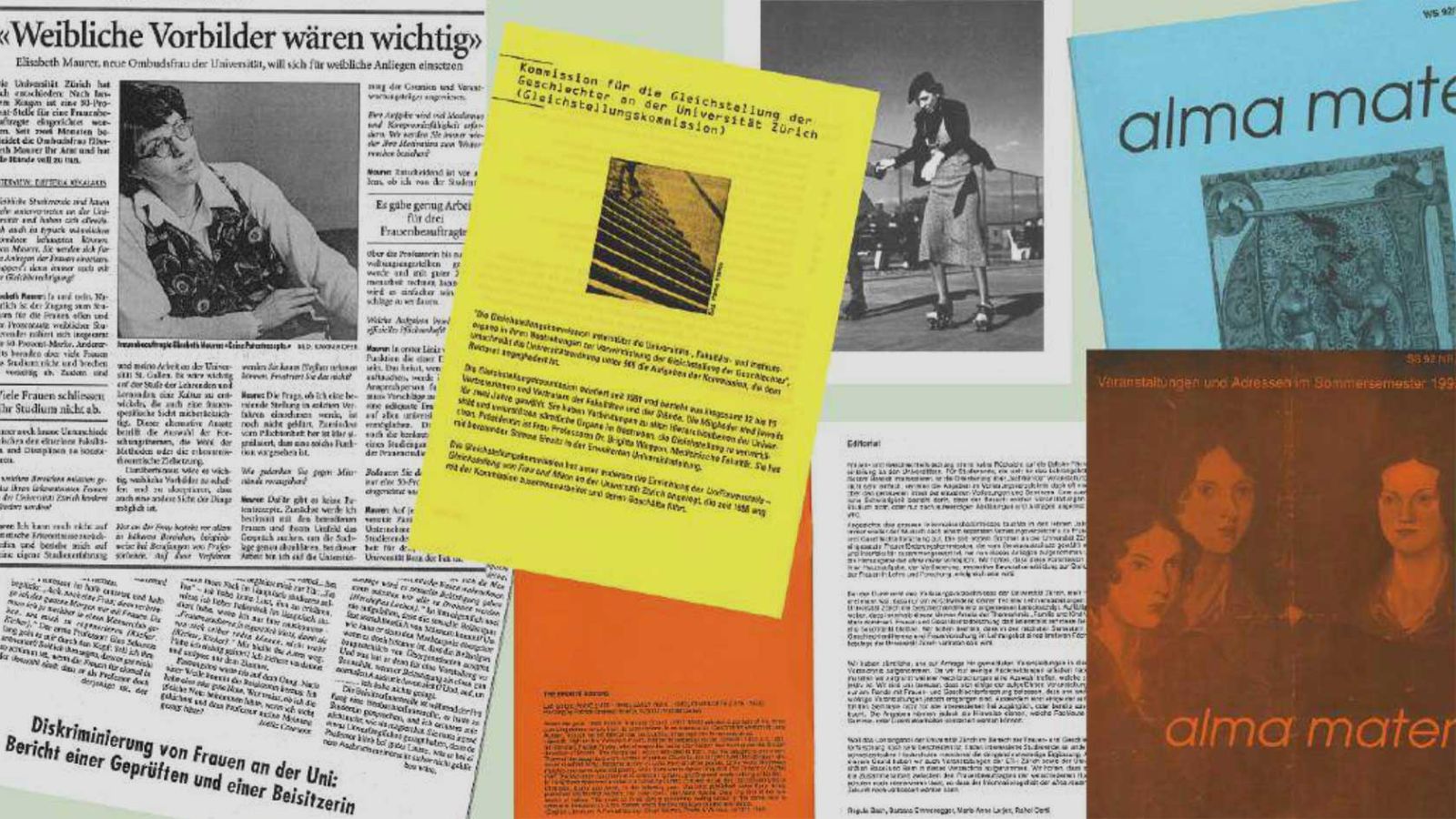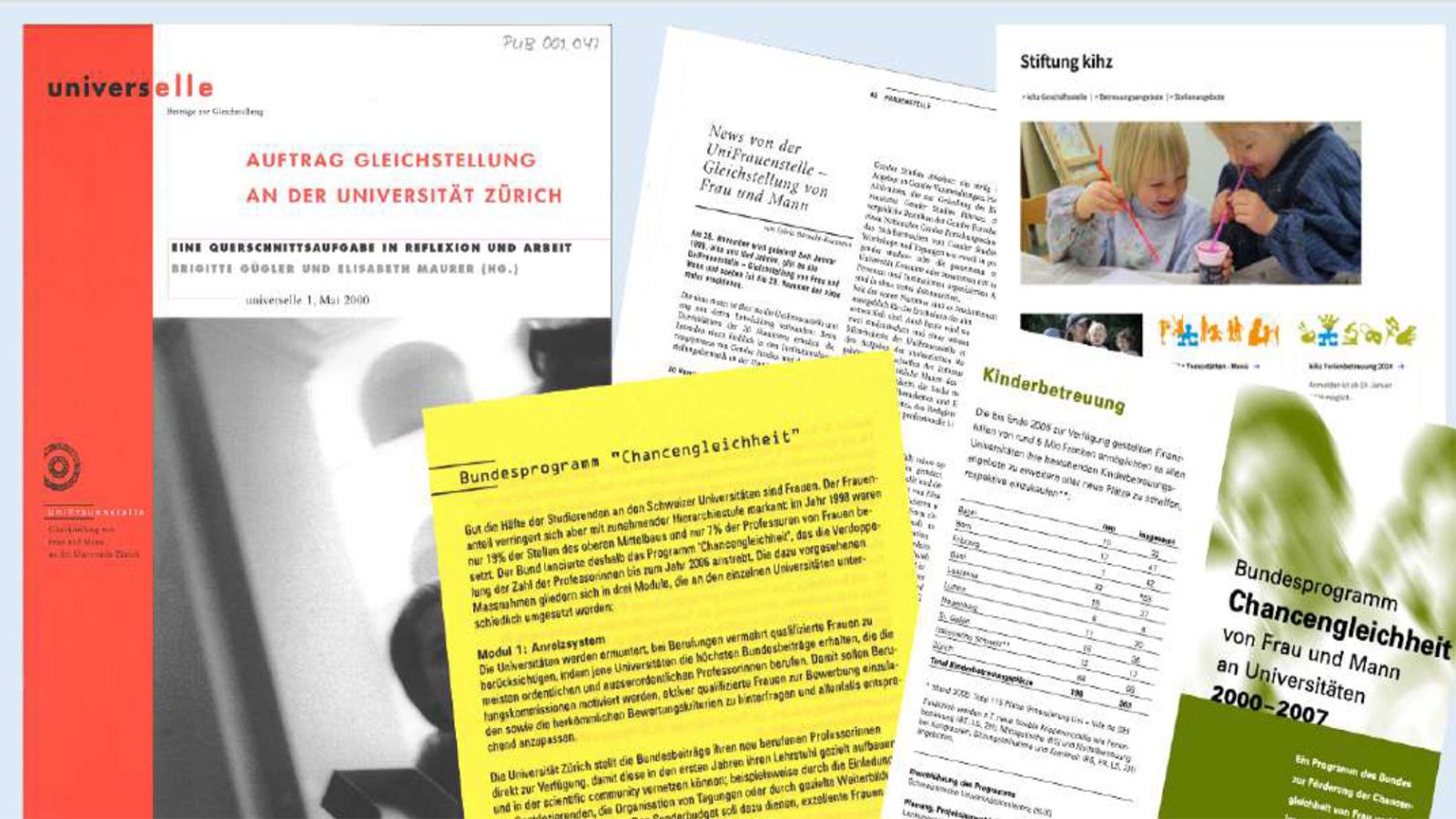From Women’s Advancement to Diversity and Inclusion
In 1989, then-UZH President Konrad Akert decided to establish a central point of contact for women at the university. This decision came about as a result of an event organized to mark 100 years of women at the university. In the run-up, professor of economics Heidi Schelbert-Syfrig and former UZH President Verena Meyer had presented their concept for advancing women at UZH to the Academic Senate. In their presentation, they had highlighted the lack of female professors at UZH. At the time, a mere 2.4 percent of professors at UZH were women.
President Akert decided to appoint Sylvia Derrer, who was employed in the Office of the President as a lawyer, to represent the interests of women at UZH, with 20 percent of her employment. In an interview with a student newspaper, Sylvia Derrer described how she was initially confronted with problems she was unable to solve on her own, such as the case of a PhD student who was having serious issues with her thesis supervisor. “I couldn’t really help her, especially since these kinds of problems were the responsibility of the faculties and not the Office of the President,” she said. She therefore suggested setting up a committee made up of members of the faculties, and this gave rise to the Commission for Women’s Advancement, which was renamed as the Gender Equality Commission in 1994. With this, the University of Zurich became a pioneer of gender equality in Switzerland, as similar offices were soon established at other universities across the country.
Equality, not advancement
From then on, the women’s representatives in the Office of the President and the Gender Equality Commission joined forces with representatives of the faculties to champion the concerns of women at UZH. Professor Heidi Schelbert-Syfrig was the first chair of the Gender Equality Commission. “It was a difficult process – everyone was in favor of gender equality, but securing funding was a challenge,” she said in an interview. And yet, they succeeded. In 1996, the position of women’s representative in the Office of the President was carried over into a women’s office (“Uni-Frauenstelle – Gleichstellung von Frau und Mann”), with Elisabeth Maurer as its head. The name-change also marked a shift in approach, with the focus no longer on advancing women but creating equality between the sexes.
This was also reflected in the University Act, according to which the university was to foster gender equality in actual practice and strive to achieve a balanced representation of both genders in all functions and bodies. However, this goal was still a long way off. While 51 percent of students at UZH were women in 1998, only 32 of a total of 389 professorships and assistant professorships were held by women. Fortunately, things have somewhat changed since then. In 2023, 216 out of 738 professorships were held by women, which corresponds to almost 30 percent. Meanwhile, today 59 percent of UZH students are women.
Promoting women’s and gender studies
Elisabeth Maurer’s work as women’s and equal opportunities representative spanned almost 20 years, during which her position grew from a part-time role into a full-time job. She built up a team that could support her in her work. Originally, her focus was on women in academia, increasing their participation in higher education and research, and promoting women’s and gender studies. Over time, however, Maurer’s role changed, evolving to focus on gender equality work that was more comprehensive, and aimed at tackling structural inequality and fostering equal opportunities. Among other things, her tasks included establishing a gender-differentiated approach to academic career development, ensuring fair procedures in professorial appointment processes, building up childcare facilities and fighting prejudices. Ultimately, the aim was to smash through the glass ceiling, the invisible barrier that often prevented women from reaching higher positions in academia. These efforts were also supported by federal programs and tailor-made projects in UZH’s seven faculties. Again, this shift was reflected in a name change: in 2009, the women’s office, or “Uni-Frauenstelle”, became the Office for Gender Equality.
Hitting a nerve
“Cooperation between the Office for Gender Equality and the chairs of the Gender Equality Commission was always crucial,” Elisabeth Maurer recalls. Together with Professor Margit Osterloh, who chaired the commission from 1996 to 2000, they established the necessary legal foundations at UZH and founded the Center of Competence Gender Studies.
Professor of psychiatry Brigitte Woggon, who succeeded Osterloh as chair and served until 2008, helped launch the Gender Policy Code of Conduct, a set of guidelines aimed at implementing equal opportunities. The controversial psychiatrist would often hit a nerve and say out loud what others were only thinking.
Change in university culture
The fifth chair of the Gender Equality Commission was Professor Brigitte Tag. Together with a working group (which included Elisabeth Maurer), she was instrumental in drawing up university regulations for the protection against sexual harassment (RSB), which were approved by the Executive Board of the University in 2007. These regulations and the work of the RSB Committee broke new ground at UZH – and paved the way for other Swiss universities to follow suit.
During this time, cooperation with the faculties was also stepped up. “This was the impetus for the Swiss federal program for equal opportunities, whose funds enabled almost all of the faculties to establish bespoke projects in close cooperation with the Gender Equality Commission and the Office for Gender Equality,” Brigitte Tag says. Among other things, these projects focused on women in leadership positions, balancing careers with having children, and fostering academic careers. “Together, we changed the university and its culture. Much of what is taken for granted today is based on the pioneering work and persistence of those working in equal opportunities at the time,” she emphasizes.
During her term as chair of the Gender Equality Commission, Professor Tatiana Crivelli worked to ensure that gender equality issues were incorporated into UZH’s Leadership and Management Principles. She was succeeded by Professor Katja Rost, who introduced salary analyses for female professors. At the same time, new professorships focusing on gender were created.
Diversity and inclusion
In 2015, Christiane Löwe took over as head of the Office for Gender Equality. She played a pivotal role in developing the UZH Diversity Policy, which the Executive Board went on to adopt in 2018. In keeping with the policy’s subheading, “Promoting, Practicing and Benefiting from Diversity”, the office began to shift its priorities. “Universities are becoming more and more aware that equality refers to more than the advancement of women. It’s about creating an inclusive environment in which everyone has equal opportunities, regardless of their gender, ethnicity, religion, sexual orientation or disability,” says Christiane Löwe.
This shift represents an important step towards a fairer society. According to Löwe, the challenge now is for universities to adapt and improve their equality work on an ongoing basis. “We need to develop innovative strategies to promote the diversity of our students and staff and fight discrimination,” she says. With this in mind, when Christiane Löwe retires in August 2024, the office will once again rethink what it does. One of the first tasks of her successor, Karin Gilland Lutz, will be to address the topic of inclusion. After 35 years, equality at UZH thus continues to broaden its focus.



